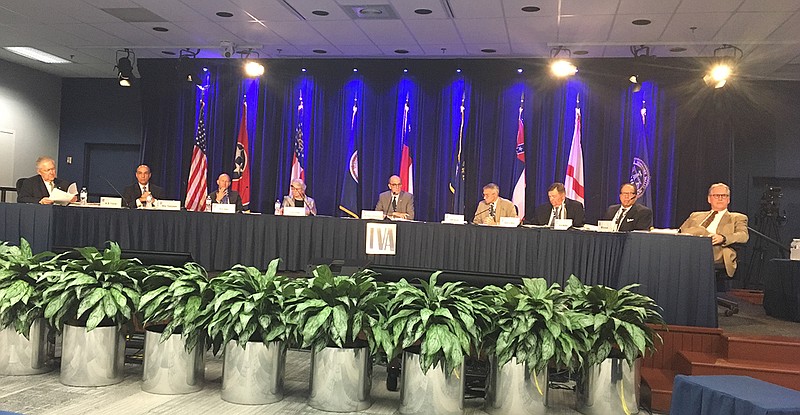KNOXVILLE - The Tennessee Valley Authority will boost electric rates by another 1.5 percent in October, adding about $2 more to the typical monthly power bill in Chattanooga.
TVA directors approved the $199 million rate hike Wednesday - the sixth such increase in as many years - as part of a $10.7 billion budget that TVA supporters say leaves the federal utility in its strongest financial condition in decades and could negate the need for such rate hikes in the next several years.
"TVA is in the best shape it has been in a very long time, and we would hope that would mean we won't have these annual rate increases going forward, barring some unexpected problem," said Doug Peters, president of the Tennessee Valley Public Power Association, which represents the 154 local power companies that distribute TVA power.
Even though TVA is on pace to achieve record profits in the current fiscal year, TVA President Bill Johnson said the rate increase is still needed this fall to help implement the agency's long-term debt reduction plan to trim long-term debt to $21.8 billion by 2023. With stagnant or declining power demand projected for the foreseeable future, TVA is eager to reduce its borrowing costs to cut interest expenses and its overall cost of power.
TVA has benefited over the past five years by reducing its operating and maintenance costs by more than $800 million a year from its 2013 levels and taking advantage of cheaper natural gas and more nuclear power generation to reduce fuel costs.
As a result, even with the October rate hike, the wholesale price of power by TVA in fiscal 2019 will average 6.8 cents per kilowatthour, down from 6.98 cents per kilowatthour in fiscal 2014 and still below where it was in fiscal 2013. Cheaper natural gas, more abundant rain and increased nuclear generation have helped cut TVA's annual fuel costs by more than $1 billion a year since 2014.
TVA said its residential power rates are among the 25 percent lowest in the country and its industrial rates are in the cheapest 10 percent of all utilities.
"Both our residential and industrial rates have become more competitive," said Johnson, who predicted that rates should remain fairly stable over the next decade, as well.
Chief Financial Officer John Thomas said TVA has reduced its debt by $1.6 billion over the past six years while investing $15 billion in capital improvements and keeping rates relatively stable overall. With the completion in the past couple of years of major nuclear and gas power plants, the agency expects to make bigger reductions in its debt in coming years.
But environmental and consumer groups claim power costs are still too high in TVA's 7-state region. During Wednesday's board meeting, many consumers objected to the utility's decision earlier this year to shift more costs of power onto the fixed portion of their bills, rather than charging by how much power they consume, and questioned why TVA was cutting back its support for energy efficiency programs.
"While TVA claims its rates are lower than 70 percent of other utilities, nobody pays rates, they pay bills," said Stephen Smith, executive director for the Southern Alliance for Clean Energy. "The bill is the rate times consumption, plus the fixed fees, and if you do that math TVA has some of the highest costs in the country."
Tennesseans pay a higher share of their income in their power bills than residents in most other states, according to the U.S. Energy Information Administration. Homes in the Tennessee Valley tend to be less well insulated and energy consumption is often higher, especially among low-income households that are much more apt to be energy burdened in the South than in other parts of the nation.
"Tennessee power bills are some of the highest in the country and we need solutions like energy efficiency and prices that help reward people for managing their energy use," said Jimmy Garland, an NAACP vice president for Tennessee.
Johnson said energy efficiency is reducing power use across the Tennessee Valley, and he expects TVA's power load to be stagnant or decline in the future as more homes and businesses use more energy-efficient lights, machines and heating and cooling equipment. The new budget reflects a $264 million decline in power sales next year due to such trends.
While TVA is continuing to support Home Energy Upgrade programs in Chattanooga and elsewhere, Johnson said the utility is spending less than in the past and that there needs to be support for energy efficiency from other players in the market.
"I think there is a big local piece that needs to be provided [to support energy efficiency]," Johnson said. "The truth is that we have a lot of housing that is not energy efficient. TVA has and does play a role, but we certainly can't fix that by ourselves."
Contact staff writer Dave Flessner at dflessner@timesfreepress.com or 423-757-6340.
